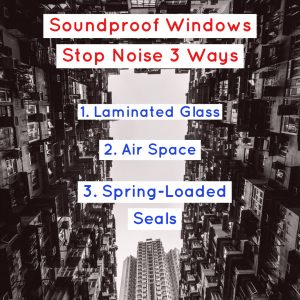
Okay, so you want to soundproof a room from outside noise. Whether you’re looking to soundproof hotel rooms, apartment complexes, condominiums, business buildings, or your own home, we at Soundproof Windows would like to offer some helpful information. In this article we’ll discuss sound-absorbing materials, sound-blocking materials, reverberation, and more.
How Do Materials Absorb and Block Sound?
Sound-absorption materials do not block sound. Sound-absorption materials reduce the bouncing and echoing of soundwaves in a given room. Sound-absorbers alter soundwave paths and convert the energy to heat. You’ll often see sound-absorbing devices constructed with foams and ‘squishy’ materials.
Sound-absorbers are designed to reduce the reverberation in a room. Reverberation refers to the continuance of sound in a room after it was originally produced.
When soundwaves get produced, they either bounce off materials in the room or they get absorbed by materials in the room.
Once a sound gets reflected on one surface, it will begin bouncing off other surfaces. Occupants of a room hear this bouncing in a more pronounced way when the room possesses hard surfaces. Sound-absorbers are generally soft and porous, so they can reduce the amount of times a sound reverberates in the room.
Sound-blockers, such as soundproof windows, possess a density capable of blocking the soundwaves themselves.
How Do Soundproof Windows Block Sound?
The first line of defense against unwanted sound that Soundproof Windows uses is laminated glass. Our glass includes a layer of PVB plastic that stops vibrations in a similar way that grabbing the strings on a recently strummed guitar will stop the sound.
The second line of defense Soundproof Windows uses is the air space between your preexisting window and the window we install on the outside. The air space retards the vibrations that would normally pass through a regular window, thus reducing the sound that passes through.
Our final line of defense against unwanted sound is the spring-loaded seals we apply to our frames. The application of spring-loaded seals ensures that our glass is under constant pressure. This pressure prevents sound leaks and reduces the vibrations attempting to pass through the glass.
